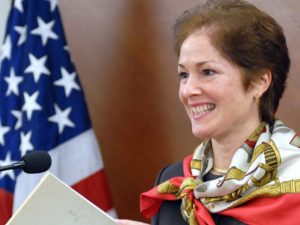
The U.S. Department of State suggested that William Taylor, who worked as an ambassador in Kyiv in 2006–2009, become charge d’affairs to Ukraine, the ZN.UA edition reported referring to sources in Washington.
According to the ezine, the temporary envoy will tentatively head the U.S. Embassy for at least a year, or even until the presidential elections in the United States in 2020.
“ZN.UA notes that Taylor is familiar with the situation in Ukraine, he constantly keeps abreast of the defense sphere, knows the situation in Donbas and understands economic issues.
As reported, in early May it became known that U.S. Ambassador to Ukraine Marie Yovanovitch finishes her work on May 20.

The team of President-elect of Ukraine Volodymyr Zelensky intends to conduct a “state audit” in the first 100 days in order to understand the state’s position, an ideologist of the Zelensky team, Ruslan Stefanchuk, notes.
“In order to perform any transformations, we need to know the human resource, financial resource and time resource. It is recorded in our program, and we will deal with it in the first 100 days: this is the announcement of the state audit. We need to understand the situation in the state today,” he said on the 112.Ukraine TV channel on Friday evening.
According to the ideologist of the team, the Ukrainian institutions, which are charged with the relevant duties, and international structures will be involved in such an audit. “It is clear that we can attract international institutions not in all areas, because it is connected with state secrets, with other things,” he said.
Stefanchuk stressed that it is important to understand the state of Ukraine’s financial obligations, the state of the infrastructure, and the state of the country’s international obligations.
“We need to know how many people there are in Ukraine today, since the number of deputies in the Verkhovna Rada depends on it. There are European norms, and they are far from being appropriate. We need to understand what social programs should be implemented. It’s not normal when today we do not know the amount of people in the country and their legal statuses,” he explained.

U.S. Ambassador to Ukraine Marie Yovanovitch is completing her diplomatic term of office in Kyiv, the American Embassy has reported.
“As Ambassador Yovanovitch concludes her diplomatic assignment in Kyiv, look back on her three years of work in Ukraine to advance,” the U.S. Embassy to Ukraine said on Facebook on Saturday.
The diplomatic mission also announced a video on the work of Yovanovitch as ambassador to Ukraine.

IT company GlobalLogic Ukraine in 2018 saw a 32% rise in revenue, which is higher than average growth, the company has said.
“Ukraine occupies an important place in the regional structure of companies. In the past calendar year, GlobalLogic’s revenue in Ukraine grew by 32%, while the local IT market is growing by an average of 20-25% per year. Similarly, our profit increased, which we do not derive from the country, and fully use for business development in Ukraine,” Managing Director of GlobalLogic in Central and Eastern Europe Ihor Beda said.
According to him, the company expects that further consolidation of efforts in Central and Eastern Europe will increase the growth of the company’s performance and investment opportunities in the region.
Following the results of the past fiscal year (April 1, 2018 – March 31, 2019), the business of the GlobalLogic group of companies in Central and Eastern Europe grew by 27.6%. At the same time, the region accounts for 46.6% of the total revenue of the group of companies in the past financial year.
“Within the region, which includes 13 engineering centers in Ukraine, Poland, Slovakia and Croatia, only last year the group of companies invested $1.5 million in professional development and training of local specialists. A significant part of these investments falls on engineering talents in Ukraine,” the company said.
As reported, GlobalLogic is consolidating its business by combining 13 local development centers in the single region of Central and Eastern Europe, which will be headed by senior vice president of the company Ihor Beda, who has been the GlobalLogic Managing Director in Ukraine since 2014.
GlobalLogic Ukraine is the largest software developer in Ukraine. It has offices in Kyiv, Kharkiv, Lviv, and Mykolaiv.